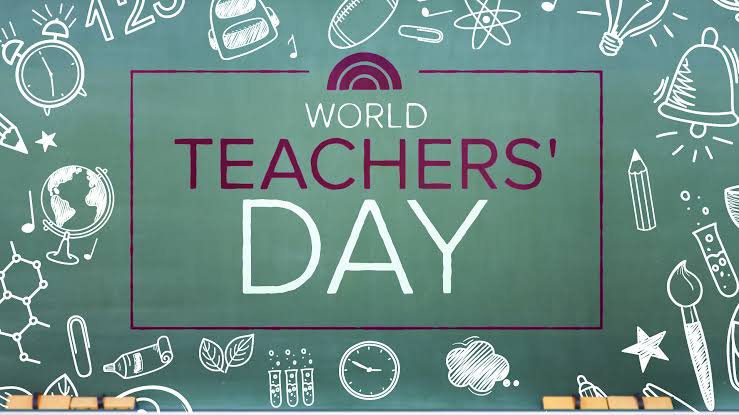Teacher’s voice should matter
Last week Saturday was observed as World Teachers Day (WTD). The day was first celebrated 30 years ago, on October 5, 1994. This first celebration was to commemorate the 30th anniversary of the 1966 conference in Paris where the United Nations Educational Scientific and Cultural Organization (UNESCO) and the International Labour Organization (ILO) established the […]

Last week Saturday was observed as World Teachers Day (WTD). The day was first celebrated 30 years ago, on October 5, 1994. This first celebration was to commemorate the 30th anniversary of the 1966 conference in Paris where the United Nations Educational Scientific and Cultural Organization (UNESCO) and the International Labour Organization (ILO) established the Special Intergovernmental Conference on the Status of Teachers in Paris. This conference adopted the UNESCO/ILO recommendation that outlines teachers’ rights and responsibilities.
WTD is marked annually on October 5 to recognize and appreciate teachers around the world. The day is dedicated to valuing those who, as teachers, shape the future by imparting knowledge and inspiring young minds. The theme for the 2024 WTD is, “Valuing Teachers’ Voices: Towards a new Social Contract for Education.” This theme underscores the relevance and importance of listening to teachers in addition to involving them in the formulation of educational policies and practices.
In the old traditional society of Northern Nigeria up to the early days of post-colonial period, any meetings convened at the village, district or emirate level by the village head, district head, or emir as the case may be was incomplete without the headmaster in attendance even though he had no traditional title. This reminds me of the “Idon Matambayi” television drama aired in the 1980s by the Nigerian Television Authority (NTA) Sokoto as well as the “Village Headmaster” aired by the NTA network service from the 1970s through 1980s. The teacher’s voice, at that time, had this recognition because people then justifiably believed that there was wisdom in his opinions and judgements.
Many teachers are at a vantage position to point out where systems could be improved upon. As the main driver of the school setting, the teacher more than any other stakeholder in the education sector knows the students better; sometimes better than their parents know them especially for students that come from homes where parents are too busy to spend quality time with their children or wards. Teachers are always with their students in the classroom, in the dining hall, on the playground, in the mosque, and sometimes in the hostel before light is put out for them to compulsorily go to bed. But today, they are seldom asked about their opinions just as they are seldom involved in the conversations that determine the development direction of education. They are rarely invited to conferences on education or partake in any discussion panels.
While the school expects teachers to produce young minds that are worthy in knowledge and character, government and the society on the other hand both have a common goal that children in the care of teachers are well prepared to become future leaders of the country as today’s leaders cannot be there forever. It would therefore be fool-hardy and extremely dangerous to ignore or pretend to ignore the voice of those in whose hands potentials leaders of the country have been entrusted.
No reasonable person would employ a chauffeur and ignore his voice because of the huge risk involved in such carelessness. unfortunately, this is the case with Nigerian teachers whose voices rarely count. A driver’s paymaster should know when the former (the driver) is hungry, angry, ill, or disturbed if the latter (the paymaster) cares much about the safety of his life. If listening to the voices of teachers also entails getting to know and addressing their collective plight, it means therefore that the deliberate refusal by relevant authorities at the school or ministry level to listen to them is equal in effect to finding pleasure in the predicaments suffered by teachers especially as it concerns their welfare.
In schools where teachers have more say in schoolwide and classroom decisions, fewer challenges are encountered concerning students’ indiscipline. For example, when students realize that their teachers were part of the decisions taken on their lesson timetables, games, preps, dining periods, and all other core-curricular and extra-curricular activities in the school, they tend to take every word from them as coming from authorities that must not be defied. But if, on the other hand, they discover that the teachers were alienated from the decisions made to regulate their conduct and activities within and outside of the classroom, humiliation would be the reaction to be suffered by teachers in the hands of students. In the school, a teacher’s voice should be strategic in determining how best to serve the needs of children. Truly, the teacher is not the only factor in a child’s educational success, but when his opinions, judgments, and experience are ignored, things could fall apart altogether.
The gains are numerous when teachers are fully engaged in all the processes connected to effective learning including the development of the curriculum, physical planning and development of the school, students’ enrolment and discipline. Teacher’s voice in all these fosters ownership and promotes shared responsibility for students’ success. Embracing the teacher’s voice is not just a pathway to quality learning; it is also a commitment to valuing and empowering the very people who shape students into productive, contributing citizens in a changing society. For government to reap valuable dividends from its investment in teachers, it should pay greater attention to their voices.
Happy 2024 World Teachers’ Day!
